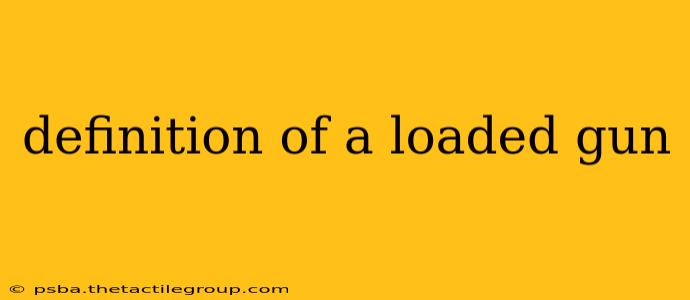A loaded gun is a firearm that has one or more cartridges in its chamber or magazine, making it immediately capable of firing. This seemingly simple definition carries significant weight, encompassing legal, safety, and ethical implications. Understanding precisely what constitutes a "loaded gun" is crucial for responsible gun ownership, self-protection, and preventing tragic accidents.
What Makes a Gun "Loaded"?
The key element is the presence of live ammunition ready for immediate discharge. This means:
- Cartridges in the chamber: The chamber is the part of the gun's barrel where the cartridge sits before firing. A cartridge in the chamber signifies a gun is immediately ready to fire.
- Cartridges in the magazine: While a magazine doesn't directly feed a round into the chamber, its presence indicates the potential for immediate loading. Many semi-automatic firearms rely on magazines, quickly making the gun ready to fire.
- The condition of the firearm: Even with cartridges present, a malfunctioning gun may not be able to fire. However, the presence of ammunition in the chamber or magazine makes it a loaded gun, regardless of the firearm's operational status.
Beyond the Basic Definition: Factors to Consider
While the presence of ammunition is the primary factor, understanding the nuances is critical:
- Type of firearm: The definition applies equally to handguns, rifles, shotguns, and other firearms. The mechanics of loading may vary, but the presence of live ammunition is the defining characteristic.
- Safety mechanisms: Safety mechanisms like a trigger lock or a deactivated firing pin reduce, but do not eliminate, the risk. A gun with a safety engaged is still considered loaded. Safety mechanisms are valuable, but shouldn't be relied upon as the sole means of preventing accidental discharge.
- Unloaded vs. Unloaded and Clear: Many gun safety experts differentiate between "unloaded" (meaning ammunition might be present elsewhere on the gun, but not in the chamber or magazine) and "unloaded and clear" (meaning the firearm is completely free of ammunition, and the chamber is visibly empty). The latter term denotes a significantly safer condition.
Legal and Ethical Considerations
The legal definition of a "loaded gun" can vary by jurisdiction and specific circumstances, often tied to laws regarding concealed carry, open carry, and storage. The ethical implications are equally significant, emphasizing the responsibility of gun owners to handle firearms safely and securely, preventing accidental shootings and misuse.
Responsible Gun Handling: The Bottom Line
The definition of a loaded gun underscores the critical importance of responsible gun ownership and handling. Always treat every firearm as if it were loaded, regardless of your belief otherwise. Proper training, secure storage, and adherence to strict safety protocols are essential to prevent accidents and ensure responsible gun use. This includes regular checks to confirm the firearm's status and a thorough understanding of its mechanics. Never assume a gun is unloaded—always visually and physically confirm its condition before handling.

